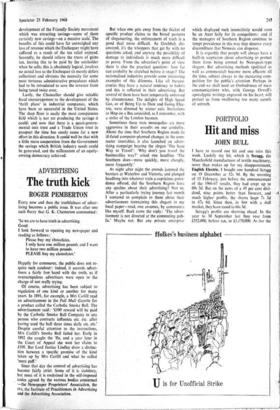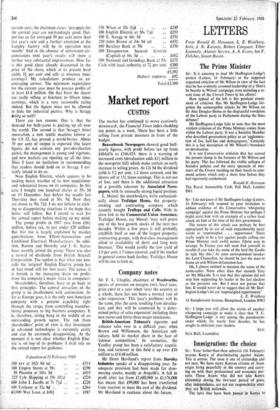Hit and miss
PORTFOLIO JOHN BULL
I have to record one hit and one miss this week. Luckily my hit, which is Scrag, the Macclesfield manufacturer of textile machinery, more than makes up for my disappointment, English Electric. I bought one hundred Scragg on 19 December at 52s 9d. By the morning of 15 February, just before the announcement of the 1966-67 results, they had crept up to 60s 3d. But on the news of a 45 per cent divi- dend, nine points better than forecast, and much higher profits, the shares leapt 7s 3d to 67s 6d. Since then, in line with a dull market, they have eased to 66s 3d.
Scragg's profits are shooting ahead. In the year to 30 September last they rose from £352,000, before tax, to £1,170,000. As for the current year, the chairman states: `prospects for the current year are outstandingly good. Out- put has so far averaged 50 per cent more than last year's rate and a further extension at the Langley factory will be in operation next month.' And in the absence of unforeseen cir- cumstances . next year's results will show a further very substantial improvement. How far is-this good cheer already discounted in the price of the share, which at its present level yields 31 per cent and sells at nineteen times earnings? My calculations produce an en- couraging answer. The minimum expectation for the current year must be pre-tax profits of at least £1.8 million. On that basis the shares are really selling at fourteen to fifteen times earnings, which is a very reasonable rating indeed. But the figures must not be allowed to hide the industrial picture. Why is Scragg doing so well?
There are two reasons. One is that the demand for bulk-yarns is picking up all over the world. The second is that Scragg's latest innovation, a new• textile machine known as the CS 12, has proved a world-beater. About 70 per cent of output is exported (the latest figures do not contain any post-devaluation gains), the management is young and vigorous, and new markets are opening up all the time. Thus I have no hesitation in recommending that readers should hold on to Scragg. I cer- tainly intend to do so.
Now English Electric, which appears to be making heavy weather of its new acquisitions and substantial losses on its computers. In this case I bought one hundred shares at 55s 3d on 15 December. Just before the results last Thursday they stood at 56s. 9d. Now they are down to 50s 7fd. I do not believe in stick- ing to disappointing situations in the hope that better will follow. But I intend to wait for the annual report before making up my mind.
The group profits in 1967 rose from £16f million, before tax, to just under £20 million. But this rise is largely explained by maiden contributions from Elliott-Automation and Combined Electrical Manufacturers. In addi- tion, Ruston and Hornsby and J. G. Statter have recently joined the group. There was also a 'revival of dividends from British Aircraft Corporation. The upshot is that what one now calls the `original' English Electric group has in -fact stood still for two years. The cause, it is hinted, is the increasing drain on profits from the company's major stake in computers.
Shareholders, therefore, have to go back to first principles. The central attraction of the group is its involvement with automation. As far as Europe goes, it is the only non-American company with a genuine capability right through the range, from controlling manufac- turing processes to big business computers. It is, therefore, sitting bang in the middle of an outstanding growth sector. The rub from shareholders' point of view is that investment in advanced technologies is extremely costly and can be extremely disappointing. At the moment it is not clear whether English Elec- tric is on top of its problems. I shall rely on the annual report for guidance.
Valuation at 21 February 1968
100 BAT at 1026 9d xd .. £514 100 Empire Stores at 58s .. .. £290 50 Phoenix at 181s 3d ... £453 225 Lyle Shipping at 19s 10fd .. £224 600 John L Jacobs at 7s 7fd .. £228 100 Unilever at 52s 9d .. £264 £2,000 War Loan at £49; .. .. £987 150 Witan at 33s l.fd • • £249 100 English Electric at 50s 71(1 • . £253 100 E. Scragg at 66s 3d £331 250 John Brown at 34s 9d xd • . £432 100 Barclays Bank at 70s £350 200 Throgmorton Secured Growth' (Capital) at 16s 3d £162 100 National and Grindlays Bank at 55s £275 Cash with local authority at ri per cent £380 £5,392 Deduct: expenses £92 Total £5,300



































 Previous page
Previous page